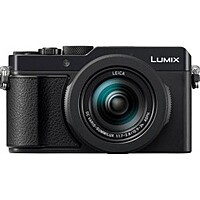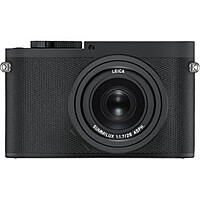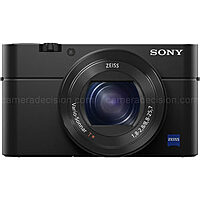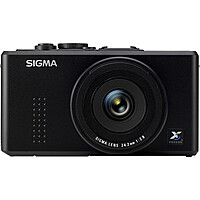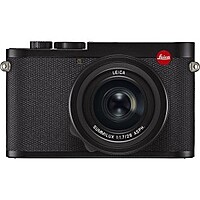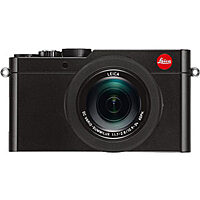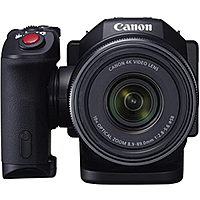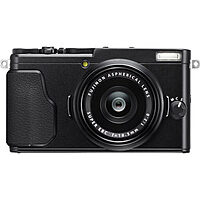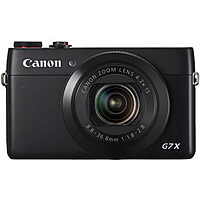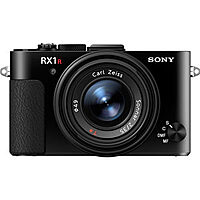Sony Cyber-shot DSC-RX100 II with Sony Cyber-shot DSC-RX100 III Overview
Let's compare Cyber-shot DSC-RX100 III with Cyber-shot DSC-RX100 II. Both cameras produced
Sony.
These models are included in the Large Sensor Compact cameras.
Sony RX100 III was released in 2014, and Sony RX100 II in 2013.
Cyber-shot DSC-RX100 III is newer, which is a plus. Cyber-shot DSC-RX100 II 1 years older.
However 1 years, the difference is not so bad.
These two cameras have the same sensor resolution - 20 MP.
The more megapixels the camera has, the more detailed and clear the picture will be. The number of megapixels will also affect the maximum size of the photos, which then can be printed without loss of quality.
At the second camera (Cyber-shot DSC-RX100 II), the minimum ISO value is lower, which gives more opportunities for shooting in daylight.
A larger maximum ISO allows you to take good pictures in the dark.
Both cameras have Optical image stabilization.
Both cameras feature a 3-inch tilting screen.
Cyber-shot DSC-RX100 III has electronic viewfinder, and the Cyber-shot DSC-RX100 II doesn’t have.
Viewfinder Cyber-shot DSC-RX100 III has a higher resolution of 1440k dots, Cyber-shot DSC-RX100 II has a resolution of no electronic viewfinderk dots.
Burst mode, also called continuous shooting mode, sports mode or continuous high speed mode, is a shooting mode in still cameras. Sony Cyber-shot DSC-RX100 III has 10.0 fps continuous shooting.
Sony Cyber-shot DSC-RX100 III has 10.0 fps continuous shooting.
| General |
Cyber-shot DSC-RX100 III |
Cyber-shot DSC-RX100 II |
| Brand |
Sony
|
Sony
|
| Model |
Cyber-shot DSC-RX100 III |
Cyber-shot DSC-RX100 II |
| Announced |
May, 2014 |
June, 2013 |
| Body Type |
Large sensor compact |
Large sensor compact |
| Lens |
| Lens Mount |
fixed lens |
fixed lens |
| Manual Focus |
|
|
| Focal Lens Multiplier |
|
|
| Number of Lenses |
0 |
0 |
| Macro Focus Range |
5 |
5 |
| Screen |
| Screen Size |
3" |
3" |
| Screen Type |
Tilting |
Tilting |
| Screen Resolution |
1229k pixels |
1229k pixels |
| Touch Screen |
|
|
| Live View |
|
|
| Viewfinder |
| Viewfinder |
Electronic |
Electronic (optional) |
| Viewfinder Resolution |
1440 |
| Viewfinder Coverage |
100% |
n/a% |
| Viewfinder Magnification |
0.59 |
0.0 |
| Autofocus |
| AF Touch |
|
|
| AF Continuous |
|
|
| AF Single |
|
|
| AF Tracking |
|
|
| AF Selective |
|
|
| AF Center |
|
|
| AF Multi Area |
|
|
| AF Live View |
|
|
| AF Face Detection |
|
|
| AF Contrast Detection |
|
|
| AF Phase Detection |
|
|
| Number of Focus Points |
25 |
25 |
| Number of Cross Focus Points |
0 |
0 |
| Photography Features |
| RAW Support |
|
|
| Min Shutter Speed |
1/30 sec |
1/30 sec |
| Max Shutter Speed |
1/2000 sec |
1/2000 sec |
| Continuous Shooting |
10.0 fps |
10.0 fps |
| Shutter Priority |
|
|
| Aperture Priority |
|
|
| Manual Exposure Mode |
|
|
| Exposure Compensation |
|
|
| Custom White Balance |
|
|
| Image Stabilization |
|
|
| Built-in Flash |
|
|
| Flash Range |
no built-in flash |
15.00 |
| Flash Modes |
n/a |
Auto, On, Off, Slow Sync |
| External Flash |
|
|
| AE Bracketing |
|
|
| AE Bracketing Range |
±3 EV |
±3 EV |
| WB Bracketing |
|
|
| Sensor |
| Sensor Size |
1 |
1 |
| Sensor Type |
BSI-CMOS |
CMOS |
| Sensor Dimensions |
13.2 x 8.8 mm |
13.2 x 8.8 mm |
| Sensor Area |
116.2 mm² |
116.2 mm² |
| Sensor Resolution |
20 MP |
20 MP |
| Max Image Resolution |
5472 x 3648 |
5472 x 3648 |
| Max Native ISO |
12800 |
12800 |
| Min Native ISO |
125 |
160 |
| Max Boosted ISO |
0 |
25600 |
| Min Boosted ISO |
0 |
100 |
| Video Features |
| 4K |
|
|
| Max Video Resolution |
1920 x 1080 |
1920 x 1080 |
| Video Formats |
MPEG-4, AVCHD, XAVC S |
MPEG-4, AVCHD |
| Timelapse Recording |
|
|
| Microphone Port |
|
|
| Headphone Port |
|
|
| Exposure Modes |
| Multi-Segment |
|
|
| Average |
|
|
| Spot |
|
|
| Partial |
|
|
| AF-Area |
|
|
| Center Weighted |
|
|
| Connectivity |
| GPS |
None |
None |
| Wireless Connectivity |
Built-In |
Built-In |
| Bluetooth |
|
|
| HDMI |
|
|
| USB |
USB 2.0 (480 Mbit/sec) |
USB 2.0 (480 Mbit/sec) |
| Battery |
| Battery Life |
320 shots |
350 shots |
| Battery Type |
Battery Pack |
Battery Pack |
| Battery Model |
NP-BX1 |
NP-BX1 |
| Physical |
| Weight |
290 g |
281 g |
| Physical Dimensions |
102 x 58 x 41 mm |
102 x 58 x 38 mm |
| Environmental Sealing |
|
|
| Water Proof |
|
|
| Dust Proof |
|
|
| Shock Proof |
|
|
| Crush Proof |
|
|
| Freeze Proof |
|
|
| Shock Proof |
|
|
| Storage |
| Storage Type |
SD/ SDHC/SDXC, Memory Stick Pro Duo/ Pro-HG Duo |
SD/SDHC/SDXC, Memory Stick Duo/Pro Duo/Pro-HG Duo |
| Storage Slots |
1 |
1 |
| Other Features |
| Self Timer |
|
|
| Selfie Friendly |
|
|
Interesting Large Sensor Compact

